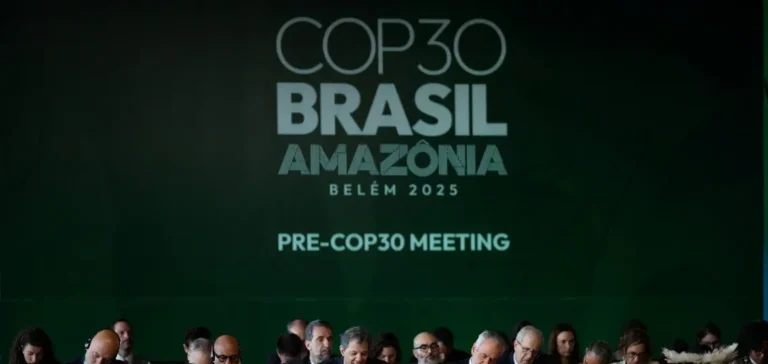Brazil reported a 16.7% reduction in its gross greenhouse gas emissions in 2024, amounting to 2.145 gigatonnes of CO₂ equivalent (GtCO₂e) compared to 2.576 GtCO₂e in 2023, according to data released by the non-governmental organization network Observatório do Clima (SEEG). This marks the largest annual decrease since 2009, just days before the opening of the United Nations Climate Conference (COP30) in Belém.
Deforestation Decline Supports Emission Reductions
The decrease in emissions is primarily attributed to a reduction in deforestation, which remains Brazil’s largest source of emissions. Land-use change accounted for 42% of gross emissions in 2024, compared to 29% from agriculture and 20% from the energy sector. From August 2024 to July 2025, the satellite-based PRODES system of the National Institute for Space Research (INPE) recorded an 11.08% drop in deforestation in the Amazon, reaching 5,796 km², the lowest level seen in eleven years.
In the Cerrado, the reduction was 11.49% over the same period. These results align with the Brazilian government’s climate trajectory and its 2035 reduction targets. Observatório do Clima stated that “the new data shows the impact of the government resuming control over deforestation,” referring to the previous administration.
Contrasting Dynamics Between Climate Policy and Energy Strategy
Despite the rapid decline in deforestation, uncertainties remain about the coherence of public policies. A recent approval for offshore oil exploration highlights these tensions. On October 20, 2025, the Brazilian Institute of Environment and Renewable Natural Resources (Ibama) issued an environmental license for Petrobras to conduct exploratory drilling on the FZA-M-059 block, located offshore the state of Amapá. The company announced the immediate start of the drilling phase, which is expected to last about five months.
This operation comes as Brazil seeks to strengthen its negotiating position at COP30. The leaders’ summit on November 6-7, followed by the main conference from November 10-21 in Belém, will highlight the country’s commitments, including its Nationally Determined Contributions (NDCs).
Emission Reduction Trajectories Affected by Economic Conditions
SEEG also emphasized that the positive results of 2024 may not persist without sustained political and economic efforts. The factors driving this year’s reductions were both cyclical and structural, suggesting a strong dependence on public action. The challenge for authorities will be to align climate policy with medium-term energy choices, especially in a context where offshore oil exploration remains strategic for the country’s trade balance.






















